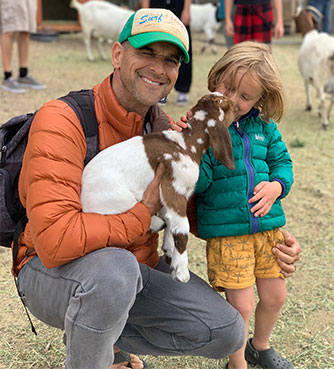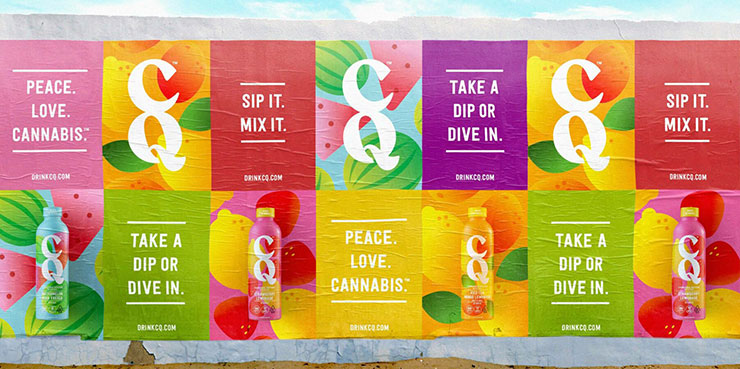Born and raised in Venice Beach, CA, with countless hardships along the way, this cannabis brand is showing others how it’s done. With a passion for cannabis and bringing it to all keen adults, Kenny Morrison, founder of VCC Brands, fought tooth and nail to get his company to where it is today.
“In 2008 when we first started, I felt that smokeless alternatives were the future of cannabis,” he says, “and the easiest way to do this was through baked goods. Over time, as the space matured and people and businesses got more sophisticated, the goal post continued to move.”

Dipping Its Toes in the Cannabis Beverage Market
Beginning in 2008 as the Venice Cookie Company, they eventually entered the THC beverage category in 2010 at the request of actor and Venice Beach resident Dennis Hopper, who was searching for a hot cannabis tea while terminally ill with prostate cancer, the company states.
Now known as VCC Brands, the company houses a family of California-bred heritage brands and IP, including California’s original bottled canna-beverage, Cannabis Quencher (CQ). The beverage eventually turned into CQ Drinks in 2022 with a rebrand, and are now available in California, Michigan, Massachusetts and Illinois. By the end of 2024, Morrison says the products should be available in eight or nine states.
CQ Drinks offers THC-infused 2oz shots, 16oz bottles and 12oz cans in a variety of flavors including Wildberry Guava Agua Fresca, Watermelon Agua Fresca, Classic Cola, Blackberry Lemon Lime, Strawberry Lemonade and more.
Kickstarting Cannabis Licensing in California
Instead of selling DTC, VCC Brands does licensing deals with licensed operators across the country. “We do royalty deals with them,” Morrison explains. “They license our formulas and our IP, and in turn, they give us a royalty. But they manage the manufacturing and the distribution, so we don’t hold cannabis licenses anymore.”
This makes it a lot easier to do business, especially since the company doesn’t need to worry about cannabis licensing — which can be a tedious and grueling process. Back in 2008, when there weren’t as many regulations and hoops to jump through, all VCC Brands needed was a reseller license from the California State Board of Equalization.
“There were no cannabis licenses when we first started,” says Morrison. “It’s not an exaggeration that we created the license types that now exist in California, just based on our operation along with others like us that started in the pre regulatory era.”
Over the years, VCC Brands moved away from manufacturing and distributing their products to strictly licensing out their formulas and IP.
Fighting Cannabis Prohibition One Step at a Time
Kickstarting cannabis licensing in California isn’t the only way Morrison is helping to push the industry forward. In the past, VCC Brands was raided by the DEA, which ultimately turned into a lawsuit. Luckily, they won, but only after spending an absurd amount of time and money dealing with the whole process. Even after winning the lawsuit, Morrison says he never got back the full amount he had spent.
“Back then, it was easier to navigate that rather than navigate these regulated markets — the layers upon layers of ideas that everybody throws into the mix throughout the process of transitioning from prohibition to legalization. They are well-intentioned, but overwhelming,” he notes.

AStrong Work Ethic and a Dedication to Success
Morrison’s extensive background has helped him prepare for the difficulties and challenges that owning your own cannabis company brings. Prior to opening the Venice Cookie Company in 2008, he was opening and managing dispensaries with a group of people that also mentored him.
“And before that, I was a filmmaker creating music videos and photographing album covers. It’s a field that you wholeheartedly immerse yourself in where you’ll be on location shooting 18 hour days for six days a week,” Morrison says. “It trains you. The film industry has a similar work ethic with that intense collaboration, dedication and commitment to executing your vision. That was good preparation for the cannabis industry.”
Morrison eventually got into the cannabis space when he started working on a documentary for one of the original dispensaries to open in Los Angeles. The owners eventually asked him to stop making the documentary and to help them open more locations. The rest is history.
Hope for the Future
Looking toward the future of cannabis, from a regulatory standpoint, Morrison thinks we are all straddling a very slow learning curve to fully understanding that the majority of industry aspects that have been implemented are moderately necessary or effective at best.
“During COVID, in California, we were deemed essential businesses,” says Morrison. “It’s ironic to think that our businesses, which were deemed essential, are being treated so poorly by the state. We are being subjected to so many costs, fees and red tape. They practically tax us out of businesses or make regulations so hard to follow that it causes even the biggest operators to go bankrupt.”
Until federal legalization takes place, cannabis businesses are stuck keeping up with ever-changing regulations and 280E. Morrison, along with many other business owners in the industry, hopes for radical change that can help these companies thrive.










